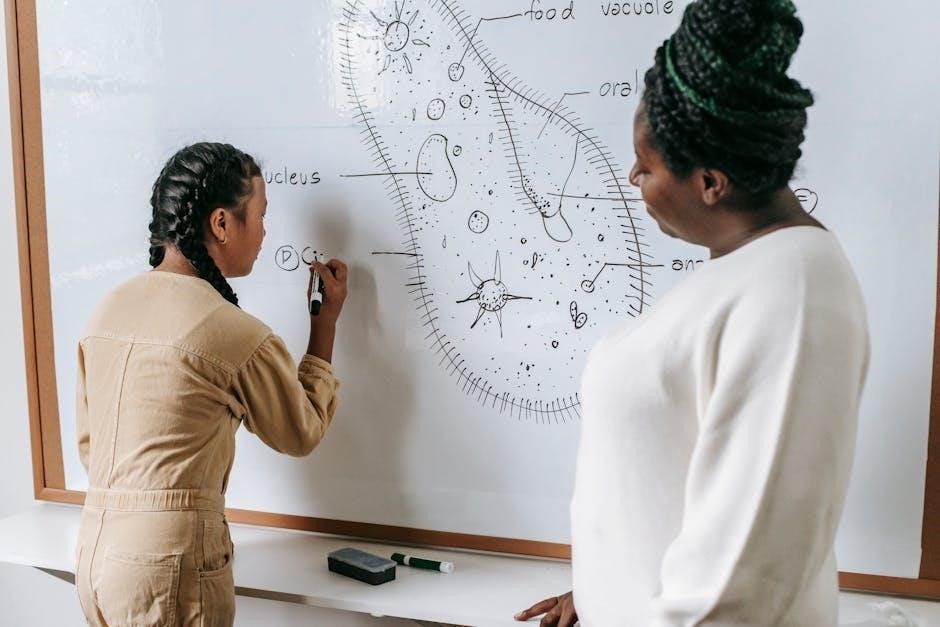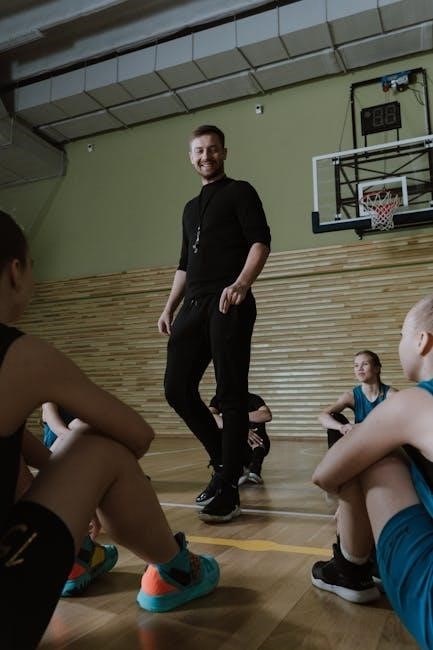
what instructional coaching is and is not
What Instructional Coaching Is
Instructional coaching is a personalized, collaborative process where experts partner with teachers to enhance instructional practices. It involves setting goals, sharing strategies, and providing feedback to improve teaching skills and student outcomes through regular, one-on-one sessions and classroom observations.

Definition and Overview of Instructional Coaching
Instructional coaching is a collaborative, goal-oriented process where educators work together to enhance teaching practices and improve student learning. It involves an expert coach partnering with teachers to analyze classroom challenges, identify effective strategies, and implement personalized improvements; Coaching is not a one-size-fits-all approach; rather, it is tailored to meet the specific needs of teachers and their students. Through regular one-on-one sessions, classroom observations, and constructive feedback, instructional coaches help teachers refine their instructional techniques, fostering professional growth. This process emphasizes sustained, personalized, and collaborative support, distinguishing it from traditional professional development. The ultimate goal of instructional coaching is to create a positive impact on both teacher performance and student outcomes, ensuring that educators are equipped with the tools and confidence to succeed in their classrooms.

The Role of an Instructional Coach in Education
The role of an instructional coach is to provide personalized support to teachers, helping them refine their instructional practices and improve student learning. Coaches work one-on-one with educators, offering feedback, strategies, and resources tailored to their specific needs. They observe classrooms, analyze teaching methods, and collaborate with teachers to set achievable goals. Instructional coaches also facilitate professional development opportunities, ensuring teachers stay updated on research-based strategies and innovative techniques. Their focus areas include improving lesson planning, enhancing classroom management, and integrating technology into instruction. Coaches act as partners, not evaluators, fostering a culture of collaboration and continuous improvement. By addressing the unique challenges teachers face, instructional coaches play a vital role in elevating teacher effectiveness and student achievement. Their work is centered on empowering educators to create engaging, effective learning environments for all students. This personalized approach ensures that coaching is both impactful and sustainable, benefiting both teachers and their students.
Key Characteristics of Effective Instructional Coaching
Effective instructional coaching is built on collaboration, trust, and a shared commitment to improving teaching and learning. Coaches must possess strong communication skills, actively listening to teachers and providing constructive feedback. They should be knowledgeable about evidence-based instructional strategies, curriculum design, and assessment practices. A growth mindset is essential, as coaches encourage teachers to embrace challenges and view failures as opportunities for growth. Flexibility and adaptability are critical, as coaching must align with the unique needs of individual teachers and schools. Coaches should also foster a culture of reflection, helping educators analyze their practices and set actionable goals. Additionally, effective coaches are empathetic, understanding the pressures teachers face, and they prioritize building strong, non-evaluative relationships. By combining expertise, empathy, and a collaborative spirit, instructional coaches create meaningful professional development experiences that lead to sustained improvements in teaching and student outcomes. These characteristics ensure coaching is both supportive and impactful.
The Process of Partnering with Teachers for Improvement
Instructional coaching is rooted in a collaborative partnership between coaches and teachers, designed to enhance teaching practices and student learning. The process begins with building trust and rapport, ensuring teachers feel supported rather than evaluated. Coaches work closely with educators to identify strengths and areas for growth, often through observation, data analysis, and open dialogue. Together, they establish clear, measurable goals tailored to the teacher’s needs and classroom context. Coaches then provide targeted support, such as modeling instructional strategies, co-planning lessons, or offering feedback based on classroom observations. Regular check-ins and reflective conversations are essential, allowing teachers to refine their skills and address challenges. The coach acts as a facilitator, empowering teachers to take ownership of their professional development. This iterative process fosters continuous improvement, as teachers apply new strategies and reflect on their impact. Ultimately, the partnership aims to create sustainable changes that benefit both educators and their students. This collaborative approach ensures coaching is both personalized and impactful.
How Instructional Coaching Impacts Teacher Performance and Student Learning
Instructional coaching has a profound impact on both teacher performance and student learning. By providing personalized support, coaches help teachers refine their instructional strategies, leading to improved classroom practices. Teachers gain confidence in implementing innovative teaching methods, which enhances their ability to meet diverse student needs. This, in turn, fosters a more engaging and effective learning environment. Research shows that instructional coaching can lead to increased student academic achievement, as teachers are better equipped to address learning gaps and differentiate instruction. Additionally, coaching promotes a growth mindset among educators, encouraging continuous professional development. The collaborative nature of coaching ensures that teachers are empowered to make data-driven decisions, further elevating student outcomes. Ultimately, instructional coaching creates a ripple effect, benefiting not only individual teachers but also their students and the broader school community. This targeted approach to professional growth is a key driver of sustainable educational improvement. Its impact is both measurable and transformative.
Research-Based Strategies in Instructional Coaching
Research-based strategies in instructional coaching are essential for enhancing teacher effectiveness and student outcomes. One key strategy is data-driven instruction, where coaches work with teachers to analyze student performance data and tailor lessons accordingly. Modeling effective teaching practices is another widely recognized approach, allowing teachers to observe and implement evidence-based techniques in real classroom settings. Video coaching is also a valuable method, enabling teachers to review recordings of their lessons and receive targeted feedback. Additionally, formative assessments are frequently used to monitor student progress and adjust instruction dynamically. Coaches often employ collaborative planning, working alongside teachers to design engaging and rigorous lesson plans. Professional learning communities (PLCs) are another research-backed strategy, fostering collaboration among educators to share best practices and address common challenges. These evidence-based approaches ensure that instructional coaching is both impactful and aligned with current educational research, leading to meaningful improvements in teaching and learning environments.
The Importance of Personalized and Collaborative Approaches

Personalized and collaborative approaches are cornerstone elements of effective instructional coaching. By tailoring coaching to meet the unique needs and goals of individual teachers, instructional coaches ensure that professional development is relevant and impactful. This personalized focus helps teachers address specific challenges, refine their instructional strategies, and enhance student learning outcomes. Collaboration further strengthens the coaching process by fostering a partnership between coaches and teachers, creating a supportive environment for open dialogue and shared problem-solving. Through collaborative planning, observation, and feedback, teachers feel empowered to take ownership of their growth while benefiting from the coach’s expertise. This dual emphasis on personalization and collaboration ensures that instructional coaching is not only meaningful but also sustainable, leading to long-term improvements in teaching practices and student achievement.

What Instructional Coaching Is Not

Instructional coaching is not a method for evaluating teachers or providing quick fixes for classroom issues. It is not a one-size-fits-all approach or a replacement for traditional professional development. Instead, it focuses on personalized, collaborative growth to enhance teaching practices and student outcomes;
Dispelling Common Misconceptions About Instructional Coaching
Many misconceptions surround instructional coaching, often leading to confusion about its purpose and benefits. One common myth is that instructional coaching is a form of teacher evaluation, when in fact, it is a supportive, non-evaluative process. Another misconception is that coaching is a quick fix for classroom challenges, but it is actually a long-term, collaborative effort focused on continuous improvement. Some believe coaching is only for struggling teachers, but it is equally valuable for experienced educators seeking to refine their skills. Additionally, coaching is not a one-size-fits-all approach; it is tailored to meet the unique needs of each teacher. It is also important to distinguish coaching from mentoring, as coaching emphasizes co-learning and problem-solving rather than offering prescriptive advice. By clarifying these misunderstandings, educators can better understand how instructional coaching empowers teachers and enhances student learning.
Instructional Coaching vs. Teacher Evaluation
Instructional coaching and teacher evaluation are often confused but serve distinct purposes. Teacher evaluation is a formal process used to assess a teacher’s performance, often tied to accountability measures, ratings, or career advancement. It typically involves observation, feedback, and judgment, with the goal of determining effectiveness based on set criteria. In contrast, instructional coaching is a supportive, non-evaluative partnership focused on improving teaching practices and student outcomes. Coaches work collaboratively with teachers to identify strengths, address challenges, and develop strategies for growth. Unlike evaluation, coaching is confidential, voluntary, and centered on professional development rather than assessment. While evaluations can create a sense of scrutiny, coaching fosters trust and openness, encouraging teachers to take risks and experiment with new approaches. The key difference lies in their objectives: evaluation measures performance, while coaching enhances it. This distinction is crucial for understanding the role of instructional coaching in fostering a growth-oriented educational environment.

Why Instructional Coaching Is Not a One-Size-Fits-All Approach
Instructional coaching is not a one-size-fits-all approach because it must be tailored to meet the unique needs of individual teachers, schools, and students. Every educator has different strengths, challenges, and goals, requiring personalized support. Coaches adapt their strategies to align with the specific context of each classroom, ensuring relevance and effectiveness. For example, a teacher in a high-needs school may require different interventions compared to one in a well-resourced environment. Additionally, instructional coaching focuses on addressing diverse student populations, varying curriculum demands, and the distinct teaching styles of educators. A standardized approach would fail to account for these differences, potentially leading to ineffective outcomes. By customizing coaching to individual circumstances, coaches can better address teacher needs, enhance instructional practices, and ultimately improve student learning. This personalized nature ensures that coaching remains flexible and impactful, rather than a rigid, generic framework applied uniformly across diverse settings.
Instructional Coaching Is Not a Quick Fix for Classroom Challenges
Instructional coaching is not a quick fix for classroom challenges because it is designed to foster long-term growth and improvement rather than providing superficial solutions. Unlike short-term interventions, coaching focuses on developing teachers’ skills, knowledge, and practices through ongoing collaboration and reflection. Coaches work with educators to identify and address the root causes of challenges, rather than merely treating symptoms. This approach requires time, effort, and commitment from both the coach and the teacher. While quick fixes might offer temporary relief, they often fail to lead to sustainable change. Instructional coaching, on the other hand, emphasizes gradual, meaningful development that enhances teaching effectiveness and student outcomes. It is a process that values deep understanding, application, and adaptation of strategies over rapid but fleeting results. By prioritizing depth over speed, instructional coaching helps educators build resilience and capacity to address future challenges independently.
Distinguishing Instructional Coaching from Traditional Professional Development
Instructional coaching differs significantly from traditional professional development in its approach, focus, and outcomes. Unlike traditional PD, which often involves one-time workshops or seminars, instructional coaching is an ongoing, personalized process. Coaches work closely with teachers to identify specific needs, set goals, and implement strategies tailored to their classroom context. This collaborative relationship fosters deep learning and sustained improvement; Traditional PD typically covers a broad range of topics for a large audience, offering general knowledge that may not directly apply to individual teachers’ challenges. In contrast, instructional coaching is highly contextual, focusing on actionable steps that teachers can immediately apply. Additionally, coaching emphasizes reflection, experimentation, and gradual refinement, whereas traditional PD often lacks follow-up or opportunities for practice. This distinction makes instructional coaching a more effective and impactful approach for teacher growth and student success. It prioritizes depth over breadth, ensuring that professional learning is meaningful and transformative.

Why Instructional Coaching Is Not Limited to New Teachers
Instructional coaching is not exclusively for new teachers; it benefits educators at all stages of their careers. While new teachers may need support in developing foundational skills and classroom management, veteran teachers can also gain from coaching by refining their practices, adapting to new educational trends, and addressing specific challenges. Coaching provides personalized guidance, helping teachers of all experience levels to enhance their instructional strategies, integrate new technologies, and improve student engagement. Experienced teachers may seek coaching to explore innovative teaching methods, deepen their subject matter expertise, or transition into leadership roles. Coaching fosters continuous professional growth, ensuring that teachers remain effective and adaptable in an ever-changing educational landscape. By focusing on individual needs and goals, instructional coaching supports teachers in maintaining a high level of professionalism and effectiveness throughout their careers. This approach underscores the importance of lifelong learning and development in education.

Clarifying the Difference Between Instructional Coaching and Mentoring
Instructional coaching and mentoring are often confused, but they serve distinct purposes in educator development. Coaching is a collaborative, goal-oriented process focused on improving specific teaching practices and student outcomes. Coaches work with teachers to identify areas for growth, develop actionable strategies, and provide feedback based on classroom observations and data. In contrast, mentoring is a broader, often longer-term relationship where a seasoned educator guides a less experienced colleague in navigating their career, building confidence, and developing professional judgment. While coaching is typically focused on specific instructional skills, mentoring addresses overall professional development, including classroom management, work-life balance, and career advancement. Both roles support teacher growth but differ in scope and approach. Coaching is often more structured and performance-driven, while mentoring emphasizes personal and professional support. Understanding these distinctions helps educators access the right support for their unique needs.

Instructional coaching is a powerful tool for enhancing teacher effectiveness and student outcomes. By focusing on collaborative, personalized, and evidence-based practices, it fosters professional growth and improves classroom instruction. Unlike mentoring, coaching is not a one-size-fits-all approach but a tailored strategy that addresses specific needs, making it a valuable investment in education.
Summarizing the Core Principles of Instructional Coaching
Instructional coaching is fundamentally a partnership-focused, growth-oriented process aimed at enhancing teacher effectiveness and student outcomes. It emphasizes collaboration, personalized approaches, and evidence-based practices to address specific teacher needs. Unlike traditional professional development, coaching is adaptive and ongoing, providing tailored support that evolves with educators. At its core, instructional coaching prioritizes student-centered teaching strategies and fosters a culture of continuous improvement. It is distinct from evaluation, mentoring, and quick fixes, focusing instead on sustainable, data-driven growth. By empowering teachers with actionable insights and skills, instructional coaching plays a vital role in advancing educational excellence and ensuring equitable learning opportunities for all students.
Related Posts

perdue chicken strips cooking instructions
Craving delicious Purdue chicken strips? We’ve got the *ultimate* guide to cooking them to golden, crispy perfection – oven, air fryer, or skillet! Get cooking now!

tyson chicken nuggets cooking instructions
Learn how to cook Tyson chicken nuggets perfectly every time! Get quick, easy, and delicious cooking instructions here.

bonavita crib assembly instructions
Get easy-to-follow Bonavita crib assembly instructions. Our guide helps you set up your crib quickly and safely with step-by-step directions.